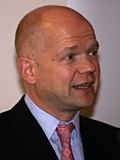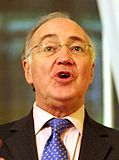| ||||||||||||||||||||||||||||||||||||
| ||||||||||||||||||||||||||||||||||||
| ||||||||||||||||||||||||||||||||||||
The 1997 Conservative Party leadership election was triggered when John Major resigned as leader on 2 May 1997, following his party's landslide defeat at the 1997 general election, which ended 18 years of Conservative Government of the United Kingdom. Major had been Conservative leader and prime minister since November 1990.
Candidates
Announced

The following candidates announced their intention to stand:
Announced but withdrew
- Stephen Dorrell – withdrew in favour of Clarke before the ballot. Dorrell had the support of 8 or 9 MPs, some of whom did not transfer their support to Clarke due to his pro-European opinions.
Declined candidates
- Michael Heseltine – had been widely expected to contest the leadership but declined to do so following health concerns. Heseltine supported Kenneth Clarke during the contest.
Not an MP at the time
In the months before the general election a number of other prominent Conservatives were talked about as potential leaders; however, several failed to hold their seats in the general election including the following:
In addition, many had speculated about Chris Patten returning to Westminster (he had lost his seat in the 1992 election) and becoming leader; however, the contest took place before Patten's term of office as Governor of Hong Kong ended.
Campaign
During the campaign Jeremy Paxman asked Michael Howard whether he had threatened to overrule the former Director General of HM Prison Service Derek Lewis when he was Home Secretary. The question was put 12 times with Howard failing to give a definitive answer.
Results
| First ballot: 10 June 1997 | |||
|---|---|---|---|
| Candidate | Votes | % | |
| Kenneth Clarke | 49 | 29.9 | |
| William Hague | 41 | 25.0 | |
| John Redwood | 27 | 16.5 | |
| Peter Lilley | 24 | 14.6 | |
| Michael Howard | 23 | 14.0 | |
| Turnout | 164 | 100 | |
| Second ballot required | |||
Howard was eliminated. He was regarded as a serious contender but had been damaged by the criticisms of Ann Widdecombe (who had served under him at the Home Office) that he had "something of the night about him" and by the decision of William Hague, who had originally agreed to support Howard and become Deputy Leader, to stand in his own right.
Peter Lilley withdrew voluntarily. He and Howard gave their backing to Hague.
Second round
| Second ballot: 17 June 1997 | |||
|---|---|---|---|
| Candidate | Votes | % | |
| Kenneth Clarke | 64 | 39.0 | |
| William Hague | 62 | 37.8 | |
| John Redwood | 38 | 23.2 | |
| Turnout | 164 | 100 | |
| Third ballot required | |||
Redwood was eliminated.
Final round

For the final round, Clarke, facing likely defeat by Hague, offered to stand aside in Michael Heseltine's favour. Heseltine was less unpopular with eurosceptics than Clarke, who was seen as the main Conservative Party champion of potential British membership of the planned euro. Heseltine, who had had a stent fitted after an attack of angina the day after the General Election, was tempted by the offer, but declined on medical advice.
Redwood gave his backing to Clarke, an unusual development in that Redwood (eurosceptic) and Clarke (europhile) held opposite views on the main issue of dispute amongst Conservatives. In return for the endorsement, it was generally understood that Clarke would name Redwood Shadow Chancellor.
This pact backfired, however, and the agreement was seen as so cynical that it drew comparison to the Nazi–Soviet Pact of the late 1930s. It prompted former Conservative Prime Minister Baroness Thatcher to publicly endorse Hague. In the event, most of Redwood's supporters switched to Hague rather than to Clarke.
| Third ballot: 19 June 1997 | ||||
|---|---|---|---|---|
| Candidate | Votes | % | ||
| William Hague | 90 | 55.2 | ||
| Kenneth Clarke | 72 | 44.2 | ||
| Abstentions | 1 | 0.6 | ||
| Turnout | 163 | 99.4 | ||
| William Hague elected | ||||
Julian Lewis announced that he was the only MP who did not vote.
Aftermath
Under William Hague's leadership, the party would fail to make any significant advance at the 2001 general election, netting only a single seat, and he was succeeded by Iain Duncan Smith.
In 1998, the system of leadership elections was altered to one where MPs vote in rounds to select a shortlist of two candidates, who are then presented to the mass membership to choose. This system was first used in the 2001 leadership election and a modified form of these rules remains in place today.
An incumbent leader can still be ousted by a no confidence vote of Conservative MPs, as was done to Iain Duncan Smith in October 2003. A leader could therefore (in principle) be ousted by MPs despite still enjoying the support of the mass membership.
References
- ^ "The 1997 Conservative Leadership Contest". BBC Politics 97. BBC. 1997. Retrieved 19 June 2012.
- "Dorrell Pulls Out of Leadership Race". BBC Politics 97. BBC. 1997. Retrieved 19 June 2012.
- "Kenneth Clarke". BBC Politics 97. BBC. 1997. Retrieved 19 June 2012.
- "Paxman takes on Howard one last time". BBC News. Retrieved 22 October 2023.
- "Howard Under Attack by Former Minister". BBC Politics 97. BBC. 1997. Retrieved 19 June 2012.
- "Lilley and Howard Quit Leadership Race". BBC Politics 97. BBC. 1997. Retrieved 19 June 2012.
- Michael Heseltine, Life in the Jungle, Hodder & Stoughton, 2000, ISBN 0-340-73915-0, pp. 532–4.
- Clarke 2016, p. 399.
- ^ "John Redwood". BBC Politics 97. BBC. 1997. Retrieved 19 June 2012.
Books used for references
- Kenneth Clarke, Kind of Blue, Macmillan, 2016, ISBN 1-509-83719-1
- Michael Heseltine, Life in the Jungle, Hodder & Stoughton, 2000, ISBN 0-340-73915-0
| 1997 Conservative Party leadership election | |
|---|---|
| Outgoing Leader: John Major | |
| *Withdrew |
| William Hague | ||
|---|---|---|
| Politics |  | |
| Ideology | ||
| General election | ||
| Party election | ||
| Local elections | ||
| European elections | ||
| Michael Howard | ||
|---|---|---|
| Politics |  | |
| General election | ||
| Party elections | ||
| Local elections | ||
| European elections | ||
| Related | ||




